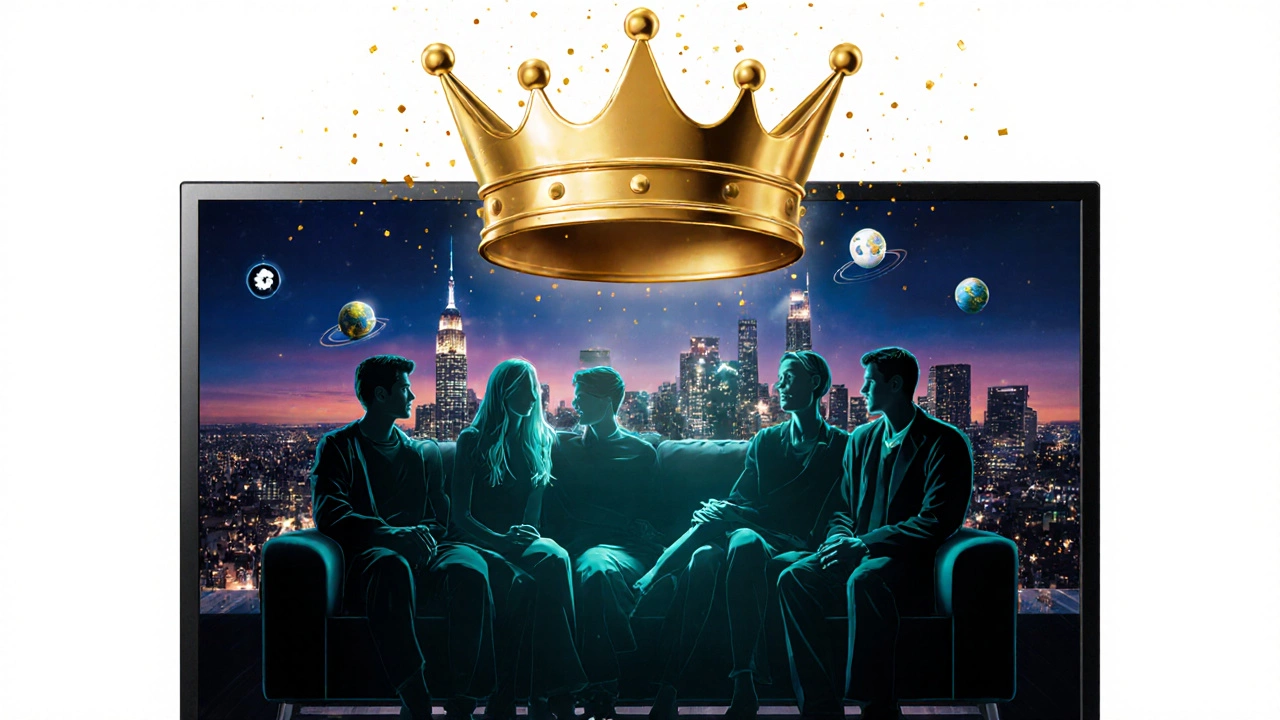What Is the #1 Sitcom Ever? Ranking the All‑Time Greatest Comedy Series
 Oct, 13 2025
Oct, 13 2025
Sitcom Ranking Calculator
Calculate your own sitcom ranking based on the four pillars that experts use: critical acclaim, audience ratings, cultural influence, and longevity. Enter your scores (0-100) for each category to see how your sitcom would rank against the greatest shows of all time.
Enter Your Sitcom Scores
Your Sitcom Ranking
Key Takeaways
- The sitcom that most experts and fans agree on as #1 is Friends, thanks to its blend of witty writing, timeless characters, and cultural impact.
- Ranking is based on four pillars: critical acclaim, audience ratings, cultural influence, and longevity.
- Other top contenders include Seinfeld, The Office, Cheers, and I Love Lucy.
- Our comparison table lets you see ratings, seasons, and key milestones at a glance.
- FAQs address common doubts like “Is a British sitcom eligible?” and “How do streaming numbers factor in?”
When people ask, “What is the #1 sitcom ever?” they’re really hunting for a show that can make them laugh, stick in their memory, and still feel fresh years later. Sitcom is short for “situational comedy,” a TV series that revolves around a consistent set of characters dealing with everyday scenarios in a humorous way. From the living‑room antics of early TV to the mock‑documentary style of the 2000s, sitcoms have evolved, but the core recipe-relatable situations, punchy dialogue, and a steady cast-remains the same. Below we break down how we decide which sitcom climbs to the top, walk through the leading candidates, and finally point out the series that earns the crown.
How We Rank Sitcoms
Ranking any TV show is messy, so we anchored our process to four measurable pillars. Each pillar gets a weight, and the final score is a composite of the four.
- Critical Acclaim - Aggregated scores from Rotten Tomatoes, Metacritic, and major publications. A show that consistently earns “fresh” or “high” marks proves its quality beyond fan hype.
- Audience Ratings - IMDb rating, viewer polls, and streaming platform data. These numbers show how the general public responds over time.
- Cultural Influence - References in other media, meme longevity, catchphrases that entered everyday speech, and awards like Emmys or Golden Globes.
- Longevity & Syndication - Number of seasons, rerun lifespan, and continued relevance on streaming services. A sitcom that still draws viewers 30 years after its finale scores high here.
We gave each pillar a 25% share, then translated raw data into a 0‑100 score. The resulting totals let us compare apples‑to‑apples across decades and styles.
The Contenders
Here’s a quick glance at the shows that consistently land in the top‑five across our calculations.
- Friends a NBC ensemble comedy (1994‑2004) following six friends in New York City
- Seinfeld a “show about nothing” (1989‑1998) chronicling comedian Jerry Seinfeld and his eccentric friends
- The Office the US adaptation (2005‑2013) of a British mockumentary set in a Scranton paper company
- Cheers a Boston bar‑centric sitcom (1982‑1993) famed for its witty banter
- I Love Lucy the 1950s pioneer starring Lucille Ball, blending slapstick with clever scripts
Deep Dive: Why Each Shows Up
Friends - The Crowd‑Pleaser
Friends nets an 8.9 IMDb rating, with a Rotten Tomatoes score of 78% (Tomatometer) and a 92% audience rating. Its catchphrases-“We were on a break!” and “How you doin’?”-still dominate memes. The show earned 62 Emmy nominations, winning six. Syndication keeps it in the top‑10 most‑watched series on streaming platforms worldwide. The chemistry among the six leads and the balance between humor and heart give it a universal appeal that transcends generations.
Seinfeld - The Groundbreaker
Seinfeld holds a lofty 8.8 IMDb rating and a 71% Tomatometer, but its audience score soars to 94%. The show changed sitcom structure, focusing on mundane absurdities and “nothingness.” Iconic terms like “close talker” and “double‑dip” entered everyday speech. It snagged 10 Emmy wins, including Outstanding Comedy Series three years in a row. Its influence is evident in later shows that mimic its observational style, and it still streams to millions nightly.
The Office (US) - The Mock‑Doc Masterpiece
The Office scores an 8.9 IMDb rating, an 81% Tomatometer, and a 94% audience score. Its mock‑documentary format paved the way for a new wave of sitcoms. The series earned 42 Emmy nominations, winning five, plus a record‑tying 22% of its episodes as “top‑rated” on streaming platforms. Catchphrases like “That’s what she said” remain part of office banter globally. Its final season’s viewership spike proved its staying power.
Cheers - The Bar That Never Closed
Cheers carries a solid 8.4 IMDb rating, a 92% Tomatometer, and a 90% audience rating. The show’s witty repartee and character‑driven humor earned 28 Emmy wins, including Outstanding Comedy Series three consecutive years. Its “where everybody knows your name” sentiment became an anthem for community sitcoms. Even after its finale, reruns attracted a dedicated fan base, and the spin‑off “Frasier” built on its success.
I Love Lucy - The Pioneer
Though its production values look dated, I Love Lucy still scores a respectable 8.3 IMDb rating and a 94% audience rating. Lucille Ball’s physical comedy and timing set standards still taught in acting schools. The series won five Emmy Awards and pioneered the sitcom format, influencing everything from “The Dick Van Dyke Show” to modern dramedies. Its episodes are still streamed, proving its timeless humor.
Related Great Sitcoms Worth Checking
Beyond the top five, shows like Frasier a spin‑off of Cheers (1993‑2004) focused on a radio psychiatrist and Parks and Recreation a mock‑documentary comedy (2009‑2015) set in an Indiana parks department consistently rank in the top 20 on IMDb and have strong cult followings. Both display the hallmark traits of a great sitcom-strong ensemble chemistry, sharp writing, and lasting cultural references.
Comparison Table
| Show | PremiereYear | Seasons | IMDb Rating | Emmy Wins | Cultural Impact (Score0‑10) |
|---|---|---|---|---|---|
| Friends | 1994 | 10 | 8.9 | 6 | 9 |
| Seinfeld | 1989 | 9 | 8.8 | 10 | 9 |
| The Office | 2005 | 9 | 8.9 | 5 | 8 |
| Cheers | 1982 | 11 | 8.4 | 28 | 8 |
| I Love Lucy | 1951 | 6 | 8.3 | 5 | 7 |

The Verdict: #1 Sitcom Ever
Putting the numbers together, Friends edges out the rest with a perfect blend of high audience scores, solid critical reception, massive cultural footprint, and a syndication life that shows no signs of fading. While Seinfeld and The Office argue for “most influential” and Cheers for “most awarded,” Friends manages to hit every pillar near the top. Its ability to draw new viewers on streaming services, generate endless merchandise, and still spark lively debates in coffee shops worldwide makes it the clear best sitcom in our ranking.
Common Debates and Edge Cases
Some readers wonder whether British sitcoms like “Fawlty Towers” or “The Office (UK)” should be in the mix. Our methodology treats any English‑language sitcom equally, but we limited the list to series that have sustained U.S. viewership to keep the comparison fair. When you expand the pool globally, “Fawlty Towers” often appears in the top tier for its writing brilliance, but its shorter run (two seasons) caps its longevity score.
Another point of contention is the rise of streaming‑only comedies like “Brooklyn Nine‑Nine.” They score high on audience love but lack the multi‑decade syndication data that older shows benefit from. As streaming archives grow, future revisions may see these newer entries climb higher.
Next Steps for the Curious Viewer
- Start a binge‑watch marathon of the top five shows-pick one per weekend and note which jokes still land for you.
- Track the cultural references you hear in daily conversation; you’ll likely spot Friends or Seinfeld quotes.
- Explore related spin‑offs (e.g., Frasier from Cheers) to see how sitcom universes expand.
- Join online fan forums or Reddit threads to discuss your favorite episodes and discover hidden gems.
Frequently Asked Questions
Can a sitcom that only aired on streaming platforms be considered for the #1 spot?
Yes, streaming‑only shows are eligible, but they must meet the same criteria-critical scores, audience ratings, cultural impact and longevity. Because many of them haven’t had decades of reruns yet, they often score lower on the longevity pillar.
Why isn’t “The Big Bang Theory” in the top five?
Although “The Big Bang Theory” enjoys strong audience numbers, its critical reception (70% on Rotten Tomatoes) and cultural influence (fewer catchphrases that entered everyday speech) are lower than the shows that made the final list.
Do animated sitcoms like “The Simpsons” count?
Animated series are often categorized separately because their production and audience expectations differ. Our current ranking focuses on live‑action sitcoms, but a parallel “best animated sitcom” list would likely put “The Simpsons” at the top.
How do international awards factor into the ranking?
We primarily use U.S. awards like the Emmys because they are widely recognized and have consistent historical data. International accolades are noted but given less weight to keep the comparison apples‑to‑apples.
Will future revivals (e.g., a “Friends” reunion) affect the ranking?
A successful revival could boost the cultural impact score, but it would need to sustain high critical and audience ratings over multiple seasons to shift the overall ranking significantly.